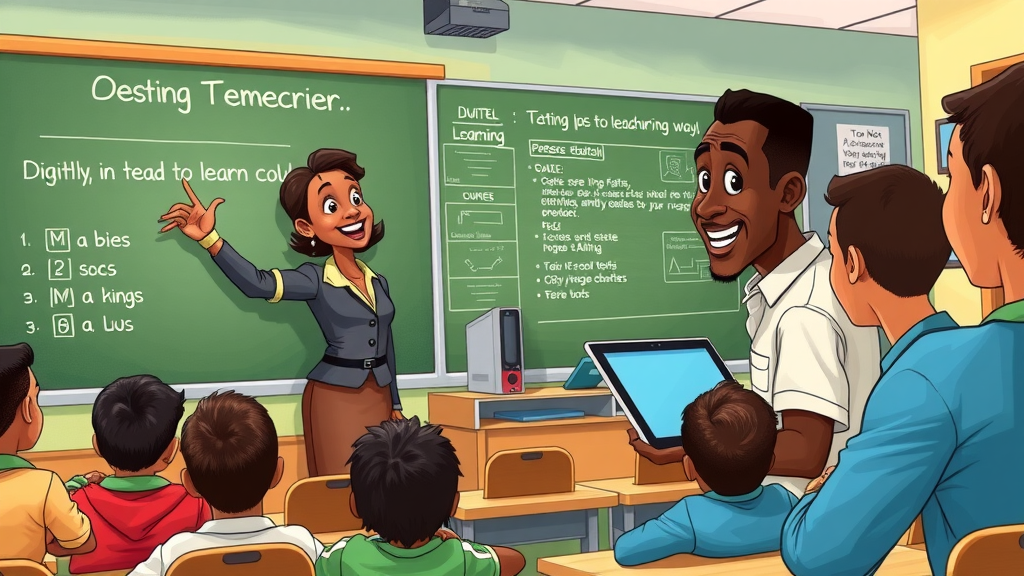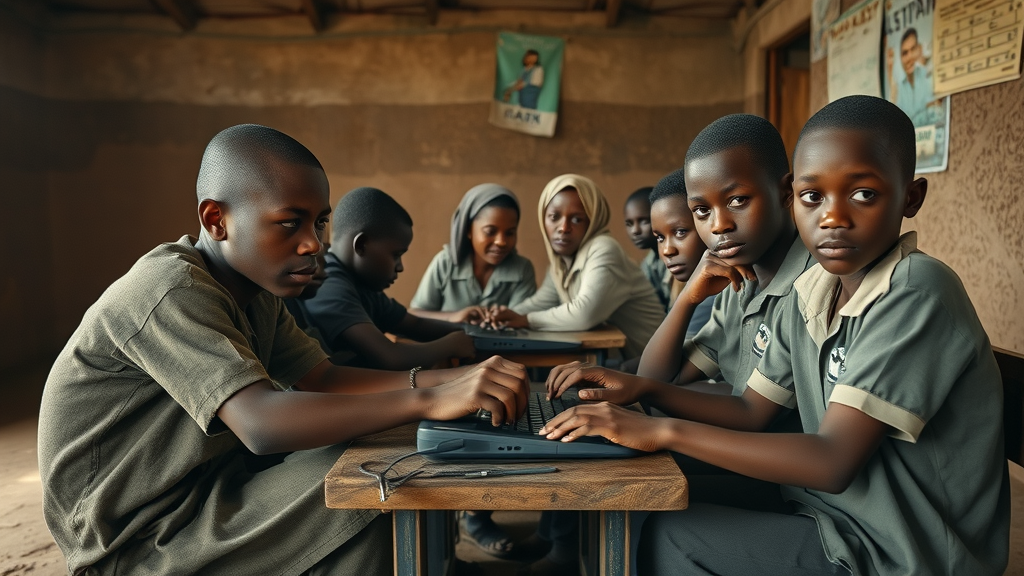Did you know over 60% of public elementary classrooms in major African cities are projected to use digital education solutions by 2025? This leap is reshaping the way millions of children learn—and the pace is only accelerating. As technology revolutionizes education across Africa, the possibilities for greater equity, innovative teaching, and empowered learners are more promising than ever. In this article, discover how elementary education technology Africa is transforming lives, the hurdles still ahead, and why your attention—and action—matter now more than ever.
Unveiling the Impact: A Data-Driven Look at Elementary Education Technology Africa
- A rapidly rising number of African schools are adopting educational technology, with projections showing over 60% of public elementary classrooms in major cities will incorporate digital education solutions by 2025.

"The pace of change in elementary education technology Africa is truly unprecedented, offering hope and challenges in equal measure."
Elementary education technology Africa now stands at a pivotal intersection—where tradition meets innovation. Recent data highlights a technology boom in African schooling, especially urban centers. According to the World Bank and regional education partners, digital education adoption is expected to reach a majority of public elementary classrooms, fueled by increased access to affordable internet and mobile devices. This surge isn’t just about flashy gadgets; it’s about broadening horizons for African students in cities from Lagos to Nairobi, who now have access to quality digital content, global resources, and interactive learning experiences previously unimaginable. The transformation is evident even in remote areas, with governments and private sector players piloting digital learning in rural schools and low-income countries like Sierra Leone.
These trends aren't limited to just numbers on a chart—they represent a paradigm shift in learning experiences, classroom engagement, and opportunities for lifelong impact. With a focus on digital literacy, educational technology in Africa is fostering an environment where both teachers and students are reimagining the classroom, experimenting with new teaching methods, and building critical skills for the workforce of tomorrow. As the continent harnesses these powerful tools, it becomes clear: the future of education in Africa lies in innovation, determination, and the relentless pursuit of opportunity.
Why Elementary Education Technology Africa Deserves Your Attention
- Bridging the digital divide in elementary learning
- Shaping future opportunities and driving innovation in educational technology
Elementary education technology Africa is more than just an emerging buzzword—it’s a bold response to one of the continent's greatest challenges: universal access to quality education. For decades, learning outcomes varied drastically across African countries due to limited infrastructure and socio-economic inequality. Now, innovative solutions are steadily bridging the digital divide, making it possible for students in both urban and rural areas to experience high-quality, interactive digital learning. Educational technology levels the playing field, closing the gap between traditional teaching and 21st-century skills, especially as internet connectivity expands throughout the region.
Beyond access, educational technology sparks possibilities. From supporting inclusive and gender-equitable learning platforms to nurturing Africa’s next generation of innovators, these digital advancements shape the future for millions. For teachers, educational tech provides new resources, training, and pedagogical tools to enhance teaching methods. For students, it unlocks a world of online educational content and platforms, enabling personalized learning at a pace appropriate to each child’s needs. Ultimately, educational technology in Africa represents hope—a pathway to uplift underserved communities, inspire young minds, and drive transformative change across a rapidly evolving education system.
The Evolution of Educational Technology in African Classrooms
From Chalkboards to Digital Learning: A Timeline
- Introduction of low-cost tablets and mobile devices
- Integration of digital education platforms for remote and blended learning

The journey from chalk-and-talk lessons to digital learning platforms has been rapid and remarkable across the continent. In just a decade, African classrooms have welcomed affordable tablets, smartphones, and even locally engineered educational tech solutions. This shift is most evident in income countries investing in blended learning, enabling students—regardless of their background—to access digital education in both traditional and remote settings. The integration of mobile devices has democratized digital learning, particularly for communities that previously lacked access to quality resources. Governments and NGOs across Africa have championed these advances, providing not just hardware but also culturally relevant digital curricula tailored for local languages and communities.
Educational technology’s integration doesn’t stop at hardware. Digital learning platforms now support teachers in content delivery, real-time assessments, and personalized feedback—enhancing the quality of education beyond what chalkboards could offer. Remote areas and rural schools, once perceived as out of reach, now partake in pilot projects and broad initiatives powered by partnerships between education ministries, the private sector, and international organizations. This evolution marks an ongoing transition from rote memorization to dynamic, student-centered instruction, positioning educational technology in Africa as not just a tool but a catalyst for holistic educational reform.
Digital Education Adoption Rates in Africa: Insights and Statistics
| Year | Nigeria | South Africa | Kenya |
|---|---|---|---|
| 2010 | 7% | 15% | 10% |
| 2015 | 18% | 34% | 25% |
| 2020 | 35% | 52% | 41% |
| 2024 (Projected) | 58% | 68% | 61% |
These figures highlight an impressive rise in digital education adoption, particularly in countries like South Africa , Kenya, and Nigeria, driven by dedicated public and private sector investment. South Africa’s focus on widespread teacher training and infrastructure has helped deliver robust learning platforms even in less affluent regions, whereas Kenya’s innovation-friendly ecosystem supports both grassroots and nationwide projects.
Nigeria, often considered Africa’s tech giant, is catching up quickly, thanks to new governmental edtech initiatives. This uptick isn’t just about numbers—each percentage point means thousands more students and teachers gaining the skills, resources, and confidence needed to thrive in a digital world. As shown, educational technology Africa stands on the cusp of unprecedented transformation—one guided by data, determination, and the unwavering belief in African students’ potential.
In the Trenches: How Teachers and Students Experience Elementary Education Technology Africa
"Access to digital learning has transformed the way I teach and the way my students learn." – Primary Teacher, South Africa
- Boosting engagement and interactive learning through educational technology tools
- Overcoming language barriers with digital resources and translation apps

Teachers and students are rapidly adapting to the opportunities—and challenges—brought by elementary education technology Africa . In classrooms from South Africa to Sierra Leone, smartboards, tablets, and interactive learning platforms are becoming the norm. Teachers report higher levels of student engagement ; with access to dynamic digital content and real-time feedback, lessons are more interactive and appealing. This, in turn, translates to better learning outcomes and improved digital literacy—a must-have skill in today’s evolving workforce.
The impact is particularly profound in overcoming language barriers and providing inclusive learning environments. Translation apps and localized educational content empower students from diverse linguistic backgrounds, allowing equitable participation for all. Digital resources also help teachers cater to individual learning styles—adjusting pace, offering visual aids, and tracking progress efficiently. While infrastructure disparities remain a reality, the sense of transformation is palpable in classrooms across the continent, as technology turns traditional teaching methods into powerful, adaptive learning experiences.
For students in remote and rural areas, even limited internet access can open the door to a world of information. Many educational tech platforms are designed to function offline or with minimal connectivity, maximizing accessibility where broadband is scarce. As teachers receive more training and support, their confidence with digital tools grows, further enhancing the quality of education. Ultimately, the integration of educational technology in Africa is about creating active, engaged learners able to navigate a rapidly changing world with skill and resilience.
The Role of Educational Tech Startups in Driving Change
Spotlight on Successful Edtech Initiatives in Africa
- M-Shule: Personalized digital learning for underserved communities
- Ubongo: Educational technology for early literacy and numeracy
"Edtech startups are vital partners in the elemental shift towards digital education in Africa."
Edtech startups have emerged as powerful agents of change, propelling elementary education technology Africa into new frontiers. Innovative companies such as M-Shule leverage artificial intelligence and mobile technology to deliver tailored learning experiences to primary students in low-income communities. By personalizing lessons and providing ongoing assessments, M-Shule responds to local needs, ensuring each child can advance at their own pace—a transformative approach in education systems marked by large class sizes and limited teaching resources.
Another standout is Ubongo , a leading producer of multimedia learning content in Swahili and other African languages. Through animated videos and interactive lessons, Ubongo is making early literacy and numeracy both fun and accessible—bridging language gaps and increasing school readiness across the continent. These examples demonstrate the unique role the private sector and local entrepreneurs play in developing meaningful solutions tailored for African classrooms. By focusing on scalable, adaptable, and inclusive technology, edtech startups complement government efforts and inspire new waves of educational innovation.
Crucially, the impact of edtech startups is amplified by partnerships with international organizations, governments, and NGOs, unlocking funding, research, and broader adoption. Whether it’s through new learning platforms, AI-enhanced curricula, or grassroot teacher training, these disruptors are pivotal in sustaining Africa’s momentum towards a digital future—one in which educational technology becomes not a luxury, but a key building block of every child’s learning journey.
Challenges Confronting Elementary Education Technology Africa
- Infrastructure gaps: Unreliable electricity and limited broadband in rural areas
- Socio-economic disparities affecting digital learning access
- Teacher training and adaptation to new educational technology

Despite remarkable progress, elementary education technology Africa still faces formidable obstacles. Infrastructure gaps remain acute in rural and remote areas , where unreliable electricity and limited broadband restrict access to digital learning. For many schools, the dream of full connectivity—and the educational possibilities it brings—remains out of reach. Efforts from the World Bank and national governments are ongoing, but closing these gaps requires sustained investment from both public and private sectors.
Socio-economic divides are just as critical as technological ones. In many communities, families can’t afford devices, and schools have too few resources to go around. Without policies aimed at equitable distribution and maintenance of equipment, the risk is that the digital divide may deepen rather than shrink. Moreover, teacher training remains an urgent need. Rolling out new technology is only half the battle; educators need ongoing professional development and support to adapt to fast-changing teaching tools and methodologies. Investing in the capacity and confidence of teachers is key to ensuring the success and sustainability of any digital education program.
Finally, the need for localized, culturally relevant educational content must be addressed. Educational tech solutions must account for the diversity of languages, traditions, and learning environments across the continent. Only then can technology serve as a force for unity, empowerment, and meaningful learning, rather than just another barrier or fleeting trend.
Opportunities: How Digital Education Can Transform the Continent
Equitable Learning and Gender Inclusivity via Educational Tech
- Improved access for girls and marginalized students
- Customizable digital curricula for local languages and cultures

The potential benefits of elementary education technology Africa go far beyond test scores—they promise profound social change. Digital education helps remove longstanding barriers for marginalized groups, particularly girls, children with disabilities, and students in hard-to-reach areas. By designing inclusive platforms and affordable devices, innovators ensure that every child, regardless of gender or background, can engage with quality educational content and thrive academically.
Equally important is the customization of digital curricula to reflect Africa’s linguistic, cultural, and social realities. Whether it’s a lesson in Swahili for students in Kenya or interactive science modules in Zulu for classrooms in South Africa, localized content empowers learners to make meaningful connections between school and life. Digital tools also play a critical role in reducing absenteeism, as virtual and blended platforms allow students to keep learning even during disruptions—such as community relocations, health crises, or power outages.
By nurturing equitable and adaptable educational systems, technology-driven approaches lay the groundwork for a new generation of African innovators, critical thinkers, and leaders. As the private sector, NGOs, and governments join forces, the dream of inclusive, world-class education becomes a reality—one powered by digital resources, local talent, and a steadfast commitment to leaving no child behind.
People Also Ask: Addressing Key Questions About Elementary Education Technology Africa
How is digital education changing elementary schools in Africa?
- Digital education is creating new pathways for interactive learning, allowing students to access resources and teachers beyond their physical schools. It elevates engagement and bridges knowledge gaps for both urban and rural areas.
What are the main challenges facing educational technology implementation in Africa?
- The primary challenges include infrastructure limitations, insufficient teacher training, socio-economic inequality, and a need for culture-relevant content.
Which countries are leading in digital learning innovation in Africa?
- South Africa, Kenya, and Nigeria are at the forefront, largely due to investments in educational tech and governmental initiatives.
What future trends are expected in elementary education technology Africa?
- Increased integration of AI in digital education, expansion of adaptive learning platforms, and partnerships with global edtech firms are major trends.
Comparing Digital Learning Approaches: Traditional vs. Educational Technology
| Aspect | Traditional Teaching | Educational Technology |
|---|---|---|
| Learning Environment | Teacher-centered, chalkboard-based, limited resources | Student-centered, interactive platforms, rich multimedia content |
| Access to Quality Education | Variable; often limited in rural areas | Broader reach; supports remote and blended learning |
| Assessment Methods | Paper-based, delayed feedback | Real-time, data-driven, personalized |
| Role of Teacher | Instructor, source of knowledge | Facilitator, coach, tech guide |
| Student Engagement | Passive, lecture-heavy | Active, collaborative, exploratory |
This side-by-side comparison illustrates why elementary education technology Africa is so transformative. Technology-enabled classrooms foster deeper engagement, enhance learning outcomes, and create opportunities for every child to experience high-quality education—regardless of location or circumstances.
Case Study: How South Africa is Leading the Digital Education Revolution
National Policies Fueling Edtech Growth in South Africa
South Africa’s government has taken a proactive stance in integrating educational technology into the national curriculum. With strategic partnerships involving the World Bank, the Department of Basic Education, and the private sector, large-scale initiatives have provided devices, connectivity, and teacher training across provinces. The rollout of the “Operation Phakisa ICT in Education” program, for example, underscores a commitment to making digital education a centerpiece of nationwide education reform.
Grassroots Innovation: Community and NGO-led digital learning programs
From rural village schools to dynamic urban classrooms, community groups and NGOs play a vital role in expanding access to digital learning. Initiatives like the Click Foundation and SchoolNet South Africa harness private and public sector support to bring personalized learning platforms, coding clubs, and teacher support services to thousands of learners. These grassroots efforts not only bridge gaps left by infrastructure limitations but also foster community participation, digital literacy, and a culture of lifelong learning.
South Africa’s success demonstrates the power of a multi-layered approach, blending top-down national policies with bottom-up community action. By investing in infrastructure, supporting innovation, and putting teachers at the heart of digital transformation, the country is illuminating a path forward for all of Africa.
Expert Opinions: Educational Technology’s Role in Equipping the Next Generation
"Africa’s next innovators will be those who mastered the digital world in their formative years." – Edtech Thought Leader
Leading educators, technologists, and policymakers agree: the key to a vibrant, prosperous Africa lies in reimagining the future of education today. By embracing digital learning, investing in teacher capacity, and ensuring every child has access to high-quality, localized content, stakeholders can cultivate a generation ready to solve the continent’s greatest challenges. Educational technology is no longer a luxury—it is a necessity for powering economic growth and unlocking Africa’s boundless potential.
As Africa’s youth population surges, the role of educational technology in fostering critical thinking, creativity, and digital literacy grows even more vital. The journey ahead requires persistence, collaboration, and the collective will to turn innovation into action—ensuring technology acts as a force for unity and opportunity.
Video: The Real Faces of Elementary Education Technology Africa
- First-hand interviews with students and teachers discussing their digital learning journeys
From bustling city schools to remote rural classrooms, real-life stories bring the promise and challenges of digital education to life. In these interviews, teachers share how interactive lessons rekindle their enthusiasm for teaching, while students talk about the excitement of discovery, collaboration, and technology-enabled learning. These experiences reflect the resilience, resourcefulness, and ambition of a continent on the move—where technology is not just shaping minds, but shaping futures.
Frequently Asked Questions About Elementary Education Technology Africa
- What are the key benefits of using educational technology in African primary schools? Educational technology boosts engagement, individualizes instruction, bridges access gaps, and prepares students for success in a digital world.
- How can rural schools overcome connectivity challenges? By leveraging offline-first apps, solar-powered devices, and local partnerships, rural schools can deliver digital learning even without consistent internet access.
- Are there local solutions tailored to different languages and communities? Yes. Many edtech startups and NGOs focus on developing digital platforms and resources in local languages to ensure relevance and inclusivity across diverse African settings.
Video: Step-by-Step—A Day in an Elementary School Leveraging Educational Technology
- Virtual walkthrough: technology usage from morning assembly to end-of-day review
In this immersive video journey, viewers explore a typical school day powered by digital tools—from digital roll-call at assembly, interactive science experiments on tablets, blended reading circles, and individualized math practice, to an end-of-day review using online quizzes. The step-by-step walkthrough underscores the vibrant new reality for African students embracing technology one lesson at a time.
Quick Tips: How to Support the Growth of Elementary Education Technology in Africa
- Support teacher training in digital education tools
- Donate digital devices or support infrastructure projects
- Advocate for policy changes favoring inclusive educational technology

Everyone has a role to play. Whether you’re a parent, policymaker, business leader, or technologist, your support can accelerate progress. Mentor a teacher, sponsor a device, or use your voice to demand funding and inclusion—each action brings Africa closer to a future where every child has the tools to thrive.
Looking Forward: The Future Potential of Elementary Education Technology Africa
Emerging technologies reshaping digital learning
- AI-assisted and personalized learning paths
- Gamification and virtual reality for deeper engagement
The next wave of elementary education technology Africa promises even greater transformation. Artificial intelligence is making personalized learning a reality, helping teachers target instruction and monitor progress more accurately. Gamification and virtual reality immerse students in interactive, creative learning experiences, sparking curiosity and enhancing retention. These advancements aren’t just futuristic dreams—they’re launching now in pilot projects from South Africa to Kenya.
As public and private sector investment grows, innovation in digital learning platforms will continue to expand. By building on what works and learning from every success and setback, Africa can leapfrog traditional education models and set new global standards for excellence, inclusion, and lifelong learning.
Key Takeaways for Stakeholders in Elementary Education Technology Africa
- Continued investment and innovation are essential
- Partnerships between government, private sector, and local communities are vital
To create lasting change, stakeholders must stay engaged, adaptive, and collaborative. Ongoing funding, robust teacher support, and alignment between national policies and community needs are non-negotiables for lasting impact.
Your Role in Advancing Educational Technology: Get Involved and Make an Impact
- Whether you’re a teacher, policymaker, parent, or tech enthusiast, your input is crucial to sustaining the momentum in educational technology across Africa. Join the movement to make digital education accessible and meaningful for all children.
The power to transform education in Africa lies in collective action. Now is the time to step forward—share resources, champion policies, or simply spread the word. Together, we can ensure that the story of elementary education technology Africa is one of hope, innovation, and opportunity for every child.
Conclusion
Take action now—support local edtech projects, advocate for equitable access, and become a champion for digital learning in African schools!
 Add Row
Add Row  Add
Add 



Write A Comment